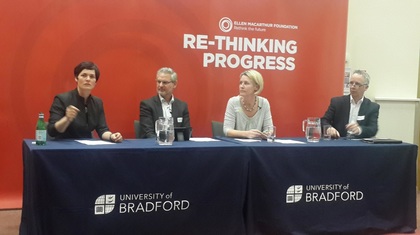 Photo credit: Cássia Ayres
Photo credit: Cássia Ayres
It is noticeable how much the circular economy has taken off in recent years and how much more often I hear it referenced and mentioned across sectors. Nevertheless, Ellen MacArthur reminded us of the '15th century map' analogy in reference to the circular economy and suggested "we probably only know 1% of what a circular economy is about; it's an exciting learning journey!"
There were many interesting discussions and presentations so I won't attempt to summarise them. However, here is a (random) selection of some of the most interesting points that really resonated with me:
- It's the system stupid: it is easy to forget that circular economy thinking is rooted in and largely dependent on understanding systems and systems thinking - it is not a linear cause and effect model of the industrial revolution. This final point is critical because it requires a fundamentally different world-view to maximise its impact and one that is often missed by practitioners looking to apply the thinking.
- Effectiveness, not efficiency: Katja Hansen, of Cradle to Cradle pioneers EPEA, suggested that we are obsessed with measuring things; but really this is a very cause and effect way of looking at things. Define what an effective solution is from a whole system point of view first before deciding how to measure success.
- Work on 'the middle': Gavin Warner suggested that at Unliever senior managers get circular economy, those joining at the bottom want it but the middle are too focussed on the short term goals - we need to work on them. So, from looking at how middle managers are incentivised to showing them the opportunities that circular economy approaches present, this is where we need to focus to effect the greatest change.
- Environmental regulation is "an opportunity": staying with Gavin Warner, it was very refreshing to hear a senior innovation director at a large company like Unilever describing environmental legislation as a good thing and an "opportunity". I agree completely and provided it is clear and focussed on the right things we need more legislation to really drive a shift in our economy and business focus.
- Circular economy helps you get closer to customers: Pia Heidenmark Cook highlighted that she is increasingly engaging sceptical colleagues at Ikea by highlighting how circular business models can bring them closer to customers. I agree and one of my favourite aspects of product to service thinking is how much it tends to 'close the customer loop'.
- Look at the whole value chain for low value products: a common criticism and challenge for the circular economy is how we can make it work for low value products; we can all see how it would work for a washing machine, but what about that horrible plastic toy my son is pestering me about? Markus Zils, of Returnity Partners, highlighted the importance of whole system thinking in solving this conundrum - focus on the whole value chain not just the product to find the circular opportunities.
- It's an economic framework: Ken Webster of the foundation reminded us of an obvious but important point - it is fundamentally an economic framework. However, from my point of view it requires a broader approach to be genuinely effective in organisations - both in the form of more biology and chemistry understanding (as witnessed by most people at the conference relative weakness around the left hand biological flows of the 'butterfly diagram') and also in the areas of behavioural economics, marketing and customer understanding to really create effective and lasting circular solutions.
If the above has piqued your interest, do take a look at the three excellent annual reports from the Ellen MacArthur Foundation and sign up for updates on the Disruptive Innovation Festival this coming November that they are hosting - I have! Finally, take a look at my blog from last year highlighting five 'lenses' for circular economy business model innovation.
By Jesper Ekelund
|
|
|

 RSS Feed
RSS Feed